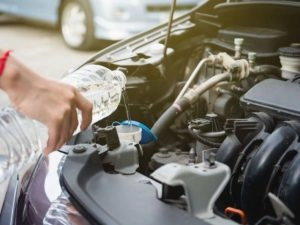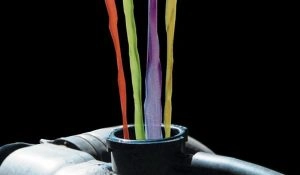Radiator water is a fundamental component in the engine cooling system, and it helps maintain the appropriate engine temperature and prevent it from damage. It is important to regularly change the water to maintain the engine's health and avoid potential malfunctions and damages.
In this article, we will discuss the types of radiator water and the intervals at which you should change it, and how to prevent water from freezing.The RadiatorYou didn't provide any text. Could you please provide the text that you want to translate.
What is radiator fluid?

It is a liquid used in the cooling systems of cars, trucks, and other machines. Its main function is to cool the engine and prevent its temperature from rising. This liquid circulates through the pipes and radiators within the engine to absorb heat and transport it to the radiator, which then reduces the heat.
It consists of ordinary water and added materials such as antifreeze and corrosion inhibitors. The composition of the car's radiator water varies depending on the type of additives used, and the type of additives is chosen based on the needs and requirements of the system and the conditions of use.
It is considered an important part of the car's cooling system, and it should be changed regularly according to the car's specific schedule, in order to maintain the safety of the system and the engine and avoid breakdowns associated with the cooling system.
Types of Radiator Water

There are many types, and there are many factors that affect the choice of the appropriate type of water. Here, we will take a look at the most common types of water:
Regular Coolant Water:
It is the most common type, containing the essential elements for engine cooling. It can be easily purchased in most stores. However, it contains ammonia, which can lead to engine corrosion and damage over time.
Organic Coolant Water:
This type consists of organic materials such as glycol, which reduces the likelihood of corrosion in the engine and is more resistant to heat than regular radiator water, requiring much less frequent changes.
Antifreeze Coolant:
It is another type of water, which contains rust and corrosion inhibitors, and can be used in old cars that have iron engines. However, it contains many harsh chemicals that can lead to damage to the hose and the upper part of the engine.
Green Coolant Water:
This type contains natural, environmentally friendly materials like organic acids and sugars. It can be used in cars that have mono-silicon engines, which require a specific type of water.
Metallic Coolant Water:
This type of water contains many valuable minerals such as magnesium and calcium, which can reduce corrosion in the engine. However, it requires a more costly change and is difficult to find in stores.
Pure Coolant Water:
This type is considered a healthy and environmentally-friendly option as it contains organic and natural materials. It can be used in new and modern cars. It is important to identify the specific components for the type of radiator used in your car and to refer to the car manual to know the suitable type.
Radiator water change intervals
The intervals for changing the water depend on the type of car and the type of water used. Generally, it is recommended to change it every 24 months or after covering a certain distance.
40,000-50,000 kilometers of driving, or when the color becomes unclear or contains impurities or deposits.
In the case of using anti-rust water, the replacement periods may be longer than that. It is preferable to refer to the manufacturer's recommendations to know the appropriate replacement period.
The following warnings indicate the need to change the car's radiator fluid:
1- Water leakage from the radiator or hoses.
2- Increase in engine temperature.
3- Appearance of a strange smell.
4- Change of water color to brown or black.
Drivers should pay attention to regularly changing it to maintain the health of the engine and ensure a longer lifespan for the car.
Reasons for the Lack of Radiator Water
Water Leakage
Water leakage is considered the most common cause.The car's radiator is low on water.Water typically leaks through those small gaps found in the radiator or radiator hoses.
When water leaks, the engine temperature rises, which can lead to engine damage.
Radiator damage
Radiator damage is another reason for water shortage. When the radiator is damaged, it loses its ability to cool, causing the engine temperature to rise. Radiator damage can occur due to several factors, including corrosion and exposure to rust.
Insufficient water filling
Not refilling the water sufficiently is another reason for the radiator's water deficiency. If there is a shortage in the amount of water, the radiator cannot function effectively, leading to an increase in the engine's temperature.
When does the radiator water freeze?
When water freezes in the radiator, it expands and causes cracks in the radiator and engine damage. This means you need to pay attention to the engine temperature and know when the water in the radiator will freeze.
The freezing point of water in the radiator.
The freezing point of the water in the radiator varies depending on the type of coolant used in the system. For example, if you use water without antifreeze, it can freeze at a temperature of 0 degrees Celsius.
But if you use antifreeze, the freezing point of water can reach -37 degrees Celsius.
How to Prevent Radiator Water from Freezing
To avoid water freezing in the radiator, some simple procedures must be followed.
Firstly: It is necessary to ensure the use of the appropriate antifreeze for the type of car and the surrounding temperature.
Secondly: The water in the radiator should be regularly changed according to the car's specific schedule.
Thirdly: The cooling system should be regularly inspected and necessary maintenance carried out to ensure its safety.
The Conclusion
By choiceThe appropriate type of radiator coolant and changing it regularly.Maintaining the health of the engine can prevent potential failures and damages.
Car owners should refer to the manufacturer's recommendations to understand the appropriate type of water and the necessary intervals for changing it.

Comments